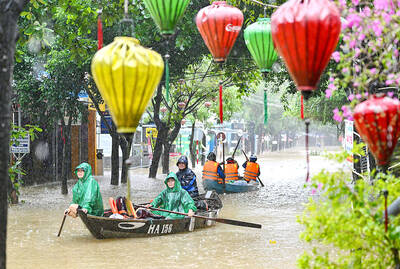Singapore's founding father said the ultramodern city-state he built is every bit a First World nation -- but still lacks the "graces of a civilized society," such as music, culture and the arts.
Lee Kuan Yew turned a resource-poor, malaria-infested backwater into a gleaming regional financial and manufacturing center with one of the world's highest living standards in less than 40 years.
But the government has been attempting to transform the city-state into a center for the arts, media and life sciences. In the past two years, it opened up a new 600 million Singapore dollar (US$352 million) arts center and is developing new areas that it hopes will become a hub for media and biotechnology firms.
"We have not reached First World standards in the finer things in life, music, culture and the arts, the graces of a civilized society," Lee said on Friday.
"The generation now in their 30s to 50s can take Singapore there in the next 15 to 20 years. The best is yet to be," Singapore's senior minister said at a Lunar New Year gathering.
Lee, 80, cautioned naysayers who have been saying the city-state's best years have passed, calling them "pessimists."
"Singapore is like an aircraft flying at 30,000 feet. We have another 6,000 feet to rise to 36,000 feet, the height [that] top US and European Union airlines are flying," he said.
After a bleak 2003 when Singapore was badly hit by SARS and the war in Iraq, Lee said the outlook this year was positive, and the economy is expected to grow between 3 and 5 percent on a good external outlook.
Lee stepped down as prime minister in 1990, a post he held since Singapore's independence in 1965, but still wields considerable influence as senior minister.

With much pomp and circumstance, Cairo is today to inaugurate the long-awaited Grand Egyptian Museum (GEM), widely presented as the crowning jewel on authorities’ efforts to overhaul the country’s vital tourism industry. With a panoramic view of the Giza pyramids plateau, the museum houses thousands of artifacts spanning more than 5,000 years of Egyptian antiquity at a whopping cost of more than US$1 billion. More than two decades in the making, the ultra-modern museum anticipates 5 million visitors annually, with never-before-seen relics on display. In the run-up to the grand opening, Egyptian media and official statements have hailed the “historic moment,” describing the

‘CHILD PORNOGRAPHY’: The doll on Shein’s Web site measure about 80cm in height, and it was holding a teddy bear in a photo published by a daily newspaper France’s anti-fraud unit on Saturday said it had reported Asian e-commerce giant Shein (希音) for selling what it described as “sex dolls with a childlike appearance.” The French Directorate General for Competition, Consumer Affairs and Fraud Control (DGCCRF) said in a statement that the “description and categorization” of the items on Shein’s Web site “make it difficult to doubt the child pornography nature of the content.” Shortly after the statement, Shein announced that the dolls in question had been withdrawn from its platform and that it had launched an internal inquiry. On its Web site, Le Parisien daily published a

UNCERTAIN TOLLS: Images on social media showed small protests that escalated, with reports of police shooting live rounds as polling stations were targeted Tanzania yesterday was on lockdown with a communications blackout, a day after elections turned into violent chaos with unconfirmed reports of many dead. Tanzanian President Samia Suluhu Hassan had sought to solidify her position and silence criticism within her party in the virtually uncontested polls, with the main challengers either jailed or disqualified. In the run-up, rights groups condemned a “wave of terror” in the east African nation, which has seen a string of high-profile abductions that ramped up in the final days. A heavy security presence on Wednesday failed to deter hundreds protesting in economic hub Dar es Salaam and elsewhere, some

Flooding in Vietnam has killed at least 10 people this week as the water level of a major river near tourist landmarks reached a 60-year high, authorities said yesterday. Vietnam’s coastal provinces, home to UNESCO world heritage site Hoi An ancient town, have been pummeled by heavy rain since the weekend, with a record of up to 1.7m falling over 24 hours. At least 10 people have been killed, while eight others are missing, the Vietnamese Ministry of Natural Resources and Environment said. More than 128,000 houses in five central provinces have been inundated, with water 3m deep in some areas. People waded through